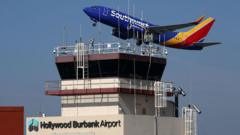This legal battle underscores tensions between federal actions and state governance in California, particularly regarding Trump's immigration policies.
**Conflicted Court Ruling: Trump Retains Control of California National Guard Amid Protests**

**Conflicted Court Ruling: Trump Retains Control of California National Guard Amid Protests**
An appeals court has momentarily granted Trump authority over California’s National Guard, conflicting with a federal judge's directive.
The legal saga deepened just hours ago as an appeals court issued a temporary stay, allowing President Donald Trump to keep control of California's National Guard amidst ongoing protests in Los Angeles. Earlier, a federal judge had deemed the president's deployment of National Guard troops to the city as unauthorized, sparking fierce debate over state versus federal authority.
Trump has argued that deploying approximately 4,000 National Guard members and 700 Marines was necessary to maintain order during protests against his immigration policies. “We needed to stop LA from burning down,” he stated. However, California Governor Gavin Newsom and local authorities claimed the military presence was inappropriate and counterproductive.
The legal proceedings began after California filed a lawsuit asserting that Trump violated federal law by taking control of the National Guard without the governor's consent. Judge Charles Breyer ruled on Thursday that Trump had overstepped his authority, ordering that control of the National Guard should revert to Governor Newsom immediately. However, he suspended this ruling until Friday, enabling the Trump administration to appeal, which they promptly did.
During the hearing, Breyer emphasized the constitutional framework governing military authority, contrasting presidential powers with historical precedents. He actively questioned the legitimacy of Trump's actions while defending the necessity of upholding legal protocols. “The president is limited in authority,” he said, reinforcing the importance of constitutional governance compared to monarchical rule.
The government maintained that the National Guard's presence was essential to safeguard Immigration and Customs Enforcement (ICE) operations amidst rapidly escalating protests, which had resulted in over 300 arrests. “We are restoring order, not violating rights,” said Trump, linking the National Guard's role to national security.
As tensions mount and concerns about federal overreach remain prevalent, the legal battle will continue with a hearing set for Tuesday. The appeals court's decision allows the National Guard to stay in Los Angeles, stirring ongoing debate regarding the balance of power between state leaders and the federal government amidst a climate of unrest and heightened security concerns surrounding immigration policy.
Trump has argued that deploying approximately 4,000 National Guard members and 700 Marines was necessary to maintain order during protests against his immigration policies. “We needed to stop LA from burning down,” he stated. However, California Governor Gavin Newsom and local authorities claimed the military presence was inappropriate and counterproductive.
The legal proceedings began after California filed a lawsuit asserting that Trump violated federal law by taking control of the National Guard without the governor's consent. Judge Charles Breyer ruled on Thursday that Trump had overstepped his authority, ordering that control of the National Guard should revert to Governor Newsom immediately. However, he suspended this ruling until Friday, enabling the Trump administration to appeal, which they promptly did.
During the hearing, Breyer emphasized the constitutional framework governing military authority, contrasting presidential powers with historical precedents. He actively questioned the legitimacy of Trump's actions while defending the necessity of upholding legal protocols. “The president is limited in authority,” he said, reinforcing the importance of constitutional governance compared to monarchical rule.
The government maintained that the National Guard's presence was essential to safeguard Immigration and Customs Enforcement (ICE) operations amidst rapidly escalating protests, which had resulted in over 300 arrests. “We are restoring order, not violating rights,” said Trump, linking the National Guard's role to national security.
As tensions mount and concerns about federal overreach remain prevalent, the legal battle will continue with a hearing set for Tuesday. The appeals court's decision allows the National Guard to stay in Los Angeles, stirring ongoing debate regarding the balance of power between state leaders and the federal government amidst a climate of unrest and heightened security concerns surrounding immigration policy.



















